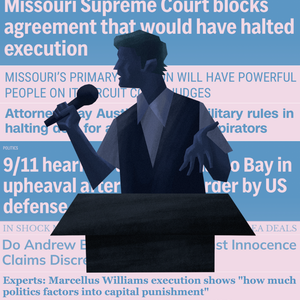
A federal district court judge has approved a settlement of a class action challenge to the conditions of confinement on Pennsylvania’s death row that officially ends the state’s policy of mandatory incarceration of death-row prisoners in permanent solitary confinement.
The court approval comes nearly five months after the Department of Corrections agreed to a tentative change to the conditions of incarceration. In a 14-page Memorandum and Order, Judge John E. Jones III of the United States District Court for the Middle District of Pennsylvania called the former conditions “draconian” and expressed “absolutely no hesitancy” in accepting the proposed agreement, which he said “effectuates a sweeping alteration of the class members’ conditions of confinement.”
The settlement agreement, reached in November 2019, provides death-row prisoners with at least 42.5 hours a week out of their cells and 15 minutes of phone access each day and allows prisoners to have contact visits, outdoor exercise, daily showers, group religious services, jobs, and access to educational programs. It also ends the Commonwealth’s practices of subjecting death-row prisoners to body cavity searches whenever they leave their cells and requiring 24-hour illumination of the prisoners’ cells. Pennsylvania had already begun implementing some of the terms of the agreement in anticipation of its approval.
Prior to the settlement, prisoners on death row were kept alone in their 8‑by-12-foot cells for 22 hours on weekdays and all day on weekends, and they were denied human contact with family members and direct access to their lawyers during visits. They also were not eligible for jobs or educational opportunities. The settlement also includes a provision to provide “resocialization assistance” for those who endured solitary confinement.
Several other states have recently taken similar steps to improve the conditions of confinement for prisoners on death row. In May 2019, a federal appeals court in Virginia ruled that the Commonwealth’s former policy of 23- or 24-hour per day solitary confinement of death-row prisoners constituted cruel and unusual punishment in violation of the Eighth Amendment. Two months later, in the midst of a federal lawsuit challenging its death-row conditions, South Carolina ended its practice of housing death-row prisoners in as much as 23-hour per day solitary confinement in windowless cells the size of a parking space. In September 2019, Oklahoma ended its policy of housing its death-row prisoners in solitary confinement in an underground facility that civil rights groups had called “inhumane and oppressive.” The groups had threatened legal action if the state did not institute reforms.
Decades of research show that solitary confinement, like that experienced by death row prisoners, is deeply detrimental to mental health, and international human rights groups have likened it to torture.
Mark Scolforo, Death row inmates’ deal for better conditions gets approved, Associated Press, April 9, 2020; Matt Miller, Pa.’s death row inmates will have easier, more social lives under deal approved by federal judge, Harrisburg Patriot-News/PennLive, April 9, 2020.
Read the Memorandum and Order approving the settlement in Reid v. Wetzel.
Oklahoma
Oct 04, 2024

A Chance at Life, Withdrawn: When Politics Interferes with Plea Deals
Pennsylvania
Sep 30, 2024

